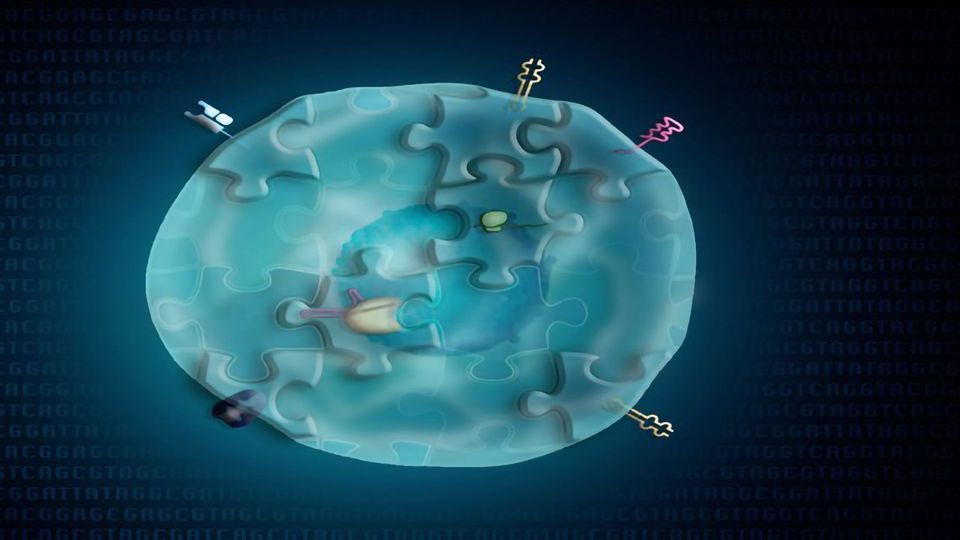Interrogation of Single Cells Taken One Step Further With ECCITE-Seq

Complete the form below to unlock access to ALL audio articles.
A new technique called ECCITE-seq, developed by scientists at the New York Genome Center's (NYGC) Technology Innovation Lab, allows researchers to perform high-throughput measurements of multiple modalities of information from single cells.
The technique, ECCITE-seq, published today in Nature Methods, stands for Expanded CRISPR-compatible Cellular Indexing of Transcriptomes and Epitopes by sequencing. ECCITE-seq profiles different types of biomolecules from thousands of single cells in parallel, offering a breadth of information that can be used as readout in CRISPR-based pooled genetics screens.
"ECCITE-seq is a next-generation tool that enhances our ability to more thoroughly investigate single cells and better understand disease mechanisms," said Tom Maniatis, PhD, NYGC's Scientific Director and Chief Executive Officer.
In 2017, the Technology Innovation Lab published a related tool, CITE-seq, which enabled detection of proteins together with transcriptomes in single cells. They followed up this work by using the same concept to barcode individual samples allowing multiplexing of single cell RNA sequencing experiments in a method named Cell Hashing, published in 2018.
"For ECCITE-seq, we adapted our previous work on protein detection and sample multiplexing and combined them with the ability to directly detect single guide RNAs used for CRISPR screens," said Peter Smibert, PhD, Manager of the NYGC Technology Innovation Lab and corresponding author on the new study. "The separate measurements in ECCITE-seq are modular, so researchers can pick and choose which measurements they need to make for the question they are asking," he continued.
"Perhaps the most important application of this method lies in CRISPR screens," said Eleni Mimitou, PhD, Senior Research Scientist in the NYGC Technology Innovation Lab and first author on the study. "Combining direct capture of guides with multimodal readouts promises to make these single cell screens more robust and efficient and reveal cellular phenotypes that can't be detected at the RNA level alone," she continued. In a proof-of-principle analysis, Dr. Mimitou and colleagues demonstrated highly-efficient guide capture coupled with a guide-specific response on the target transcript and markedly reduced protein levels. ECCITE-seq is compatible with existing CRISPR guide libraries and can be widely applied to the detection of perturbations at the level of single cells.
ECCITE-seq is built upon the Single cell Immune Profiling solution from 10x Genomics, which enables researchers to reconstruct clonotypes of individual immune cells. The researchers combined protein detection with transcriptomes and clonotypes to characterize malignant populations in a sample from a patient with cutaneous T cell lymphoma. Combining modalities enabled fine dissection of specific cell subtypes and helped reveal a transcriptomic signature of malignant cells.
"While we have demonstrated the utility of this method in cancer, it is a platform that can be applied to the study of a range of biological systems and diseases. With future developments including the addition of new modalities, we see ECCITE-seq and future methods that expand upon it serving as fundamental tools for better interrogation of individual cells," explained Dr. Smibert.
To better serve the single cell RNA-seq community, the group has been openly sharing protocols and advice through CITE-seq.com, a platform that resulted in many other groups using ECCITE-seq prior to publication.
The Technology Innovation Lab is a dedicated incubator within the NYGC comprised of a multidisciplinary team in which staff scientists and faculty, as well as many research collaborators, can explore and test breakthrough genomic tools and ideas. Co-authors on the study include additional members of the Technology Innovation Lab, members of the labs of NYGC Core Faculty Members Rahul Satija, PhD, and Neville Sanjana, PhD, who have joint appointments at NYU, and members of the Koralov Lab at NYU and the Ouyang Lab at the Jackson Laboratory.
This article has been republished from materials provided by the New York Genome Center. Note: material may have been edited for length and content. For further information, please contact the cited source.
Reference: Mimitou et al. 2019. Multiplexed detection of proteins, transcriptomes, clonotypes and CRISPR perturbations in single cells. Nature Methods. DOI: https://doi.org/10.1038/s41592-019-0392-0.

